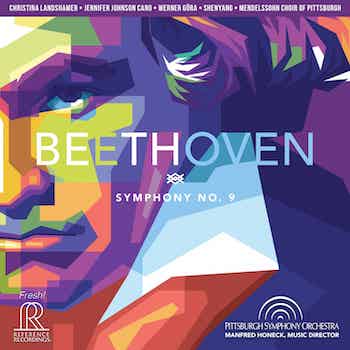Classical CD Review: Pittsburgh Symphony Orchestra plays Beethoven’s Ninth
By Jonathan Blumhofer
Manfred Honeck’s one of the finest and most exciting Beethoven conductors around, but his interpretive decisions result in an account of the Ninth’s climactic sequence that comes over as episodic and mannered.

Manfred Honeck’s one of the finest and most exciting Beethoven conductors around, as his ongoing survey of the composer’s symphonies with the Pittsburgh Symphony Orchestra (PSO) attests. Generally speaking, they combine the best characteristics of the historically-informed movement – swift tempos and textural clarity chief among them – with the full-bodied tone of a modern ensemble and a minimum of interventionist shenanigans.
Much of pairing’s new recording of the Ninth Symphony reflects these qualities.
The opening movement is purposefully directed, its rhythmic patterns snap, dynamic range is carefully shaped, and the articulation of the line – such as the broken fragments that comprise the movement’s first theme – sounds natural and “right” as ever. Also, the music’s dense, neo-Baroque textures sing with impressive transparency.
Nimble rhythms and a clear delineation of form are highlights of the Pittsburghers’ driven take on the second movement, while the third is warmly fluent. Here, again, there’s a marvelous clarity to Beethoven’s melodic writing: indeed, the foundational lyrical ideas are always audible – even in the most highly-embellished of the movement’s variations.
Then comes the finale.
To be sure, more than a few of the strengths of the first three movements are evident over its orchestral introduction. Honeck draws impeccable attacks from his forces in the opening “terror fanfare”: mighty of tone and lively of tempo, but never feeling or sounding rushed. The recitatives are flexibly shaped and the instrumental presentation of the “Ode to Joy” theme is fittingly exuberant.
But once the voices enter, Honeck’s reading seems to lose its sense of proportion and direction.
This isn’t a technical issue: the Mendelssohn Choir of Pittsburgh sings with admirable strength, blend, and diction. So, too, the quartet of soloists, led by Christina Landshamer’s ethereal soprano.
Rather, Honeck’s interpretive decisions result in an account of the Ninth’s climactic sequence that comes over as episodic and mannered.
Sometimes it’s an issue of tempo. In the Turkish March, for instance, Honeck opts for a pace that simply feels frantic. Somehow, tenor Werner Güra hangs on through it all, but little of the music’s funky, exotic character comes across. The fugue that follows is taken at a similarly brisk clip and, predictably, turns into a jumble; at a couple of points the ensemble threatens to derail entirely.
Then there are Honeck’s curious expressive choices, perhaps best summed up in his approach to the choir’s heroic statement of the “Ode to Joy” theme. In this performance, it’s presented staccato, which makes the chorus sound more like an angry mob chanting at a football game than the masses of humanity hymning Elysium. Perhaps this tack conveys revolutionary fervor, perhaps something else; I couldn’t tell. At the very least, it comes over as a self-conscious effort to sound unique – when that’s the last thing this piece needs.
True, other moments work better: the “Seid umschlungen, Millionen” fugue is lustily done; Honeck broadens out the final Maestoso very nicely (shades of Bernstein in Berlin, actually); and, except for the messy fugue, the PSO does everything asked of it. Still, this is a reading that tries too hard, highlighting the Ninth’s finale’s disparate traits without convincingly tying them together.
Ultimately, then, this last movement proves a lackluster capstone to an otherwise largely agreeable Beethoven Nine. Reference Recording’s sonics are excellent as ever and Honeck provides an explication of his views on the piece for the liner notes. They’re intriguing to consider – even if the musical results don’t always bear him out.
Jonathan Blumhofer is a composer and violist who has been active in the greater Boston area since 2004. His music has received numerous awards and been performed by various ensembles, including the American Composers Orchestra, Kiev Philharmonic, Camerata Chicago, Xanthos Ensemble, and Juventas New Music Group. Since receiving his doctorate from Boston University in 2010, Jon has taught at Clark University, Worcester Polytechnic Institute, and online for the University of Phoenix, in addition to writing music criticism for the Worcester Telegram & Gazette.
Tagged: Manfred Honeck, Pittsburgh Symphony Orchestra
